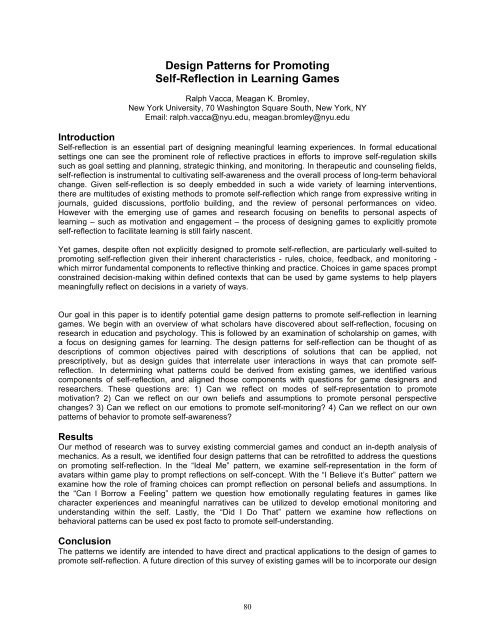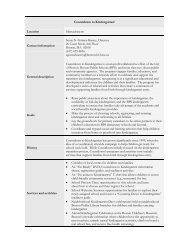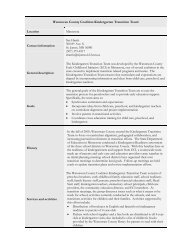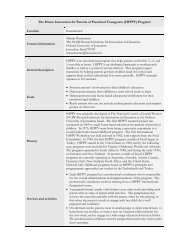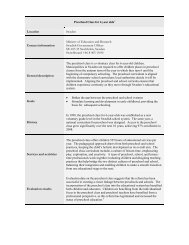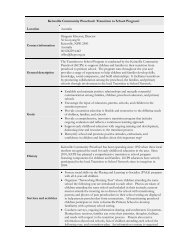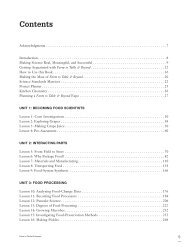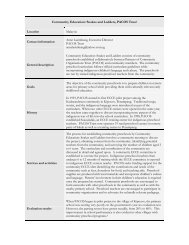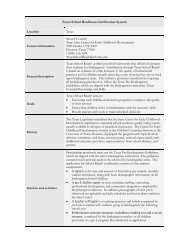Proceedings of the Fourth Annual Teachers College Educational ...
Proceedings of the Fourth Annual Teachers College Educational ...
Proceedings of the Fourth Annual Teachers College Educational ...
You also want an ePaper? Increase the reach of your titles
YUMPU automatically turns print PDFs into web optimized ePapers that Google loves.
Design Patterns for Promoting<br />
Self-Reflection in Learning Games<br />
Ralph Vacca, Meagan K. Bromley,<br />
New York University, 70 Washington Square South, New York, NY<br />
Email: ralph.vacca@nyu.edu, meagan.bromley@nyu.edu<br />
Introduction<br />
Self-reflection is an essential part <strong>of</strong> designing meaningful learning experiences. In formal educational<br />
settings one can see <strong>the</strong> prominent role <strong>of</strong> reflective practices in efforts to improve self-regulation skills<br />
such as goal setting and planning, strategic thinking, and monitoring. In <strong>the</strong>rapeutic and counseling fields,<br />
self-reflection is instrumental to cultivating self-awareness and <strong>the</strong> overall process <strong>of</strong> long-term behavioral<br />
change. Given self-reflection is so deeply embedded in such a wide variety <strong>of</strong> learning interventions,<br />
<strong>the</strong>re are multitudes <strong>of</strong> existing methods to promote self-reflection which range from expressive writing in<br />
journals, guided discussions, portfolio building, and <strong>the</strong> review <strong>of</strong> personal performances on video.<br />
However with <strong>the</strong> emerging use <strong>of</strong> games and research focusing on benefits to personal aspects <strong>of</strong><br />
learning – such as motivation and engagement – <strong>the</strong> process <strong>of</strong> designing games to explicitly promote<br />
self-reflection to facilitate learning is still fairly nascent.<br />
Yet games, despite <strong>of</strong>ten not explicitly designed to promote self-reflection, are particularly well-suited to<br />
promoting self-reflection given <strong>the</strong>ir inherent characteristics - rules, choice, feedback, and monitoring -<br />
which mirror fundamental components to reflective thinking and practice. Choices in game spaces prompt<br />
constrained decision-making within defined contexts that can be used by game systems to help players<br />
meaningfully reflect on decisions in a variety <strong>of</strong> ways.<br />
Our goal in this paper is to identify potential game design patterns to promote self-reflection in learning<br />
games. We begin with an overview <strong>of</strong> what scholars have discovered about self-reflection, focusing on<br />
research in education and psychology. This is followed by an examination <strong>of</strong> scholarship on games, with<br />
a focus on designing games for learning. The design patterns for self-reflection can be thought <strong>of</strong> as<br />
descriptions <strong>of</strong> common objectives paired with descriptions <strong>of</strong> solutions that can be applied, not<br />
prescriptively, but as design guides that interrelate user interactions in ways that can promote selfreflection.<br />
In determining what patterns could be derived from existing games, we identified various<br />
components <strong>of</strong> self-reflection, and aligned those components with questions for game designers and<br />
researchers. These questions are: 1) Can we reflect on modes <strong>of</strong> self-representation to promote<br />
motivation? 2) Can we reflect on our own beliefs and assumptions to promote personal perspective<br />
changes? 3) Can we reflect on our emotions to promote self-monitoring? 4) Can we reflect on our own<br />
patterns <strong>of</strong> behavior to promote self-awareness?<br />
Results<br />
Our method <strong>of</strong> research was to survey existing commercial games and conduct an in-depth analysis <strong>of</strong><br />
mechanics. As a result, we identified four design patterns that can be retr<strong>of</strong>itted to address <strong>the</strong> questions<br />
on promoting self-reflection. In <strong>the</strong> “Ideal Me” pattern, we examine self-representation in <strong>the</strong> form <strong>of</strong><br />
avatars within game play to prompt reflections on self-concept. With <strong>the</strong> “I Believe it’s Butter” pattern we<br />
examine how <strong>the</strong> role <strong>of</strong> framing choices can prompt reflection on personal beliefs and assumptions. In<br />
<strong>the</strong> “Can I Borrow a Feeling” pattern we question how emotionally regulating features in games like<br />
character experiences and meaningful narratives can be utilized to develop emotional monitoring and<br />
understanding within <strong>the</strong> self. Lastly, <strong>the</strong> “Did I Do That” pattern we examine how reflections on<br />
behavioral patterns can be used ex post facto to promote self-understanding.<br />
Conclusion<br />
The patterns we identify are intended to have direct and practical applications to <strong>the</strong> design <strong>of</strong> games to<br />
promote self-reflection. A future direction <strong>of</strong> this survey <strong>of</strong> existing games will be to incorporate our design<br />
80


